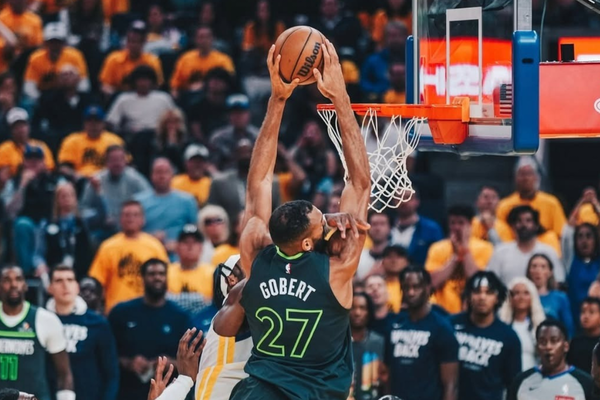
Imago
Dec 25, 2024; Dallas, Texas, USA; Minnesota Timberwolves center Rudy Gobert (27) warms up before the game between the Dallas Mavericks and the Minnesota Timberwolves at the American Airlines Center. Mandatory Credit: Jerome Miron-Imagn Images

Imago
Dec 25, 2024; Dallas, Texas, USA; Minnesota Timberwolves center Rudy Gobert (27) warms up before the game between the Dallas Mavericks and the Minnesota Timberwolves at the American Airlines Center. Mandatory Credit: Jerome Miron-Imagn Images
If you’ve been tracking the Timberwolves’ postseason run, you know Rudy Gobert has been right in the thick of it—swatting shots, crashing boards, and anchoring one of the stingiest defenses left standing. And if you were holding out for an injury update before tip-off of the Western Conference Finals? You can exhale now.
Watch What’s Trending Now!
Rudy Gobert is officially good to go for Game 1 against the Oklahoma City Thunder. The latest injury report confirms it: no limitations, no questionable tags, not even a mention. Rudy Gobert locks in as Minnesota’s starting center, ready to take on a Thunder squad that thrives off pace, space, and rim attacks. It’s the kind of matchup that practically begs for Gobert’s defensive IQ and 7-foot-9 wingspan to take center stage.
So far this postseason, Gobert’s been rock solid—averaging 8.9 points, 9.6 rebounds, and 1.3 blocks per game. He’s 11th in the league in boards, and a top-tier defense that’s given even elite offenses trouble. His presence isn’t just stabilizing—it’s essential.

And while the French big man made headlines off the court recently due to his public breakup with Julia Bonilla, he has shown zero drop-off in focus or performance. Gobert himself makes it clear: his eyes are on the title, not the tabloids.
With the Timberwolves at full strength and their core rotation intact, Gobert’s availability stands as a huge plus, especially when facing a Thunder team that loves to drive and slash. Expect him to be right in the middle of everything tonight, doing what he does best: protecting the paint, setting stonewall screens, and keeping the Wolves’ title hopes alive.
Now, with Gobert cleared and the Timberwolves at full strength, here’s how the rotation stacks up heading into Game 1.
Timberwolves Depth Chart Vs Thunder Game 1
This isn’t just names on paper—it’s a blueprint for how Minnesota plans to outlast OKC’s speed, shooting, and relentless rim pressure. The Wolves’ depth has been a quiet weapon all year, and tonight, every layer of it matters.
| POSITION | STARTER | 2nd UNIT | 3rd UNIT |
| PG | Mike Conley | Donte DiVincenzo | Rob Dillingham |
| SG | Anthony Edwards | Nickeil Alexander-Walker | Donte DiVincenzo |
| SF | Jaden McDaniels | Terrence Shannon Jr | Jaylen Clark |
| PF | Julius Randle | Naz Reid | Jaden McDaniels |
| C | Rudy Gobert | Naz Reid | Luka Garza |
If you rewind to the 2023-24 season, the Minnesota Timberwolves surprised everyone in the playoffs. A team that had long been overlooked suddenly stormed into the Western Conference Finals, riding a wave of elite defense, Anthony Edwards’ breakout performances, and the interior presence of Rudy Gobert and Karl-Anthony Towns. It felt electric. For a franchise that hadn’t been this deep into the playoffs since 2004, it felt like a turning point.
The Dallas Mavericks exposed Minnesota’s inexperience like a veteran boxer picking apart a rookie. Their tempo, shot creation, and ability to punish mistakes overwhelmed the Wolves. Minnesota struggled to keep up. They got stuck in isolation sets. Leads slipped away. Anthony Edwards had his moments, sure. But the Wolves couldn’t close games or sustain offense under pressure. They got bounced. Just like that, the dream run was over.
But it didn’t break them. It forged them.
This season’s Timberwolves came back sharper, tougher, and more cohesive. They finished 49–33, good for third in the Northwest and sixth in the West. When the postseason hit, they leaned into their identity, smothering teams with a top-five defense and eliminating the Golden State Warriors in five games.
Offensively, the Wolves moved the ball better, averaging 114.3 points on 46.8% shooting and 37.7% from deep. Edwards remained the engine (27.6 PPG), but midseason pickup Julius Randle added punch with 18.7 points and 6.6 rebounds. Rudy Gobert stayed elite on defense, anchoring the paint and grabbing double-doubles like clockwork.
Their supporting cast—Mike Conley, Jaden McDaniels, and a scrappy bench—brought balance and grit. Minnesota’s +5.0 point differential and strong rebounding showed a team no longer rattled under pressure. Now, they’re back in the Western Conference Finals—not as underdogs, but as a battle-tested unit ready to break through.

